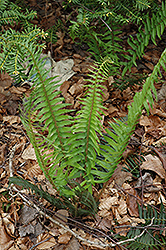Johnson Brothers Plant Finder
Height: 20 inches
Spread: 24 inches
Sunlight:
![]()
![]()
Hardiness Zone: 4b
Other Names: Northern Fern, Snake Fern, Herringbone Fern
Description:
This shade loving variety produces two frond types, sterile fronds lie flat creating a glossy groundcover, and fertile fronds emerge upright in mid-summer; perfect for wet, shaded areas of the garden or shaded containers; needs constantly moist soil
Ornamental Features
Deer Fern's glossy ferny leaves remain green in color throughout the year on a plant with a spreading habit of growth.
Landscape Attributes
Deer Fern is an herbaceous evergreen perennial with a ground-hugging habit of growth. Its medium texture blends into the garden, but can always be balanced by a couple of finer or coarser plants for an effective composition.
This is a relatively low maintenance plant, and should not require much pruning, except when necessary, such as to remove dieback. It has no significant negative characteristics.
Deer Fern is recommended for the following landscape applications;
- Mass Planting
- General Garden Use
- Groundcover
- Container Planting
Planting & Growing
Deer Fern will grow to be about 20 inches tall at maturity, with a spread of 24 inches. Its foliage tends to remain dense right to the ground, not requiring facer plants in front. It grows at a medium rate, and under ideal conditions can be expected to live for approximately 10 years. As an evegreen perennial, this plant will typically keep its form and foliage year-round.
This plant does best in partial shade to shade. It prefers to grow in moist to wet soil, and will even tolerate some standing water. It is not particular as to soil type or pH. It is somewhat tolerant of urban pollution. This species is native to parts of North America.
Deer Fern is a fine choice for the garden, but it is also a good selection for planting in outdoor pots and containers. Because of its spreading habit of growth, it is ideally suited for use as a 'spiller' in the 'spiller-thriller-filler' container combination; plant it near the edges where it can spill gracefully over the pot. Note that when growing plants in outdoor containers and baskets, they may require more frequent waterings than they would in the yard or garden.

